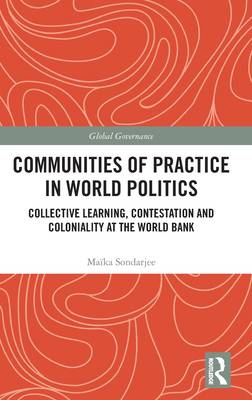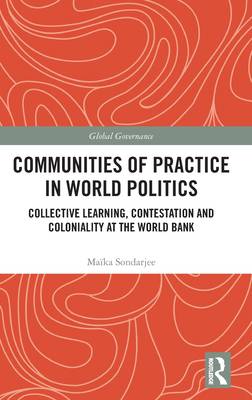
- Retrait gratuit dans votre magasin Club
- 7.000.000 titres dans notre catalogue
- Payer en toute sécurité
- Toujours un magasin près de chez vous
- Retrait gratuit dans votre magasin Club
- 7.000.000 titres dans notre catalogue
- Payer en toute sécurité
- Toujours un magasin près de chez vous
Communities of Practice in World Politics
Collective Learning, Contestation and Coloniality at the World Bank
Maïka SondarjeeDescription
By defining international communities of practice (CoPs) as domains of knowledge, this book investigates the adoption of new international practices via collective learning--that is, the redefinition of what is acceptable and feasible. Explaining how inclusive practices at the World Bank became institutionalized, it shows that while changes in presidents can influence practices of international organizations, shifts in collective thinking are even more important to understand world ordering.
Collective learning happens at the boundaries between CoPs when practitioners interact with others inside or outside the formal walls of an organization--through processes of boundary encounters, boundary brokering, and the use of epistemic boundary objects. Since the 1980s, despite stability in their technocratic political rationality, World Bank employees arranged in CoPs collectively learned that program ownership and consultation in policymaking were more effective than top-down practices. However, while learning that more democratic practices rendered their projects and policies more effective, Bank employees did not fully challenge colonial epistemic hierarchies in North-South relations. This CoP framework draws from, combines, and extends various strands of cutting-edge IR scholarship (i.e., practice-oriented and constructivist IR), management theory (communities of practice), organizational studies (narratives and day-to-day procedures), as well as development and critical studies (feminist and decoloniality approaches).
This book will be of interest not only to scholars and students interested in IR theory, international organizations, development practices, and social theory but also to development workers and anyone interested in global governance.
Spécifications
Parties prenantes
- Auteur(s) :
- Editeur:
Contenu
- Nombre de pages :
- 220
- Langue:
- Anglais
- Collection :
Caractéristiques
- EAN:
- 9781032789224
- Date de parution :
- 26-11-24
- Format:
- Livre relié
- Format numérique:
- Genaaid
- Dimensions :
- 156 mm x 234 mm
- Poids :
- 503 g







